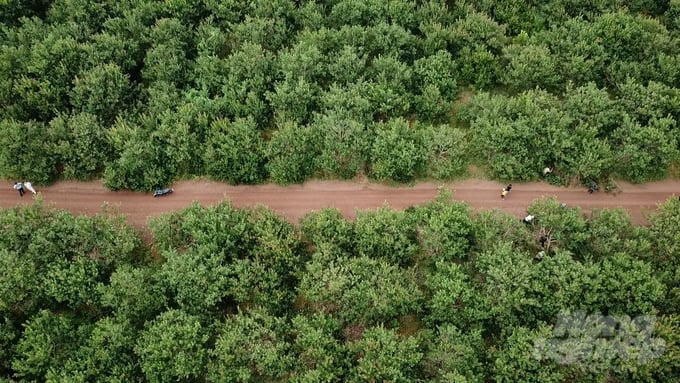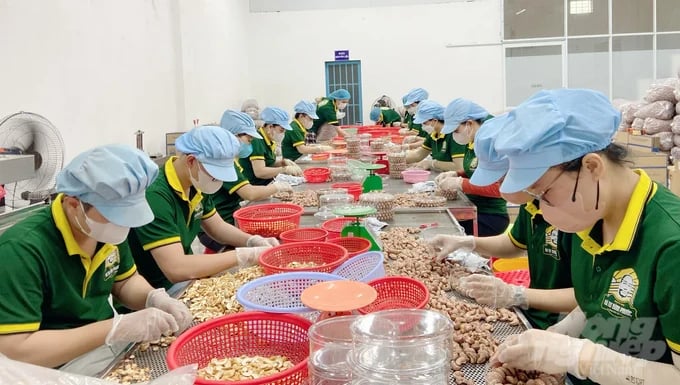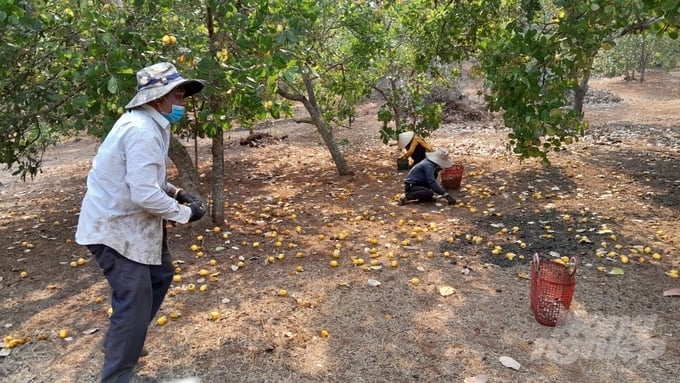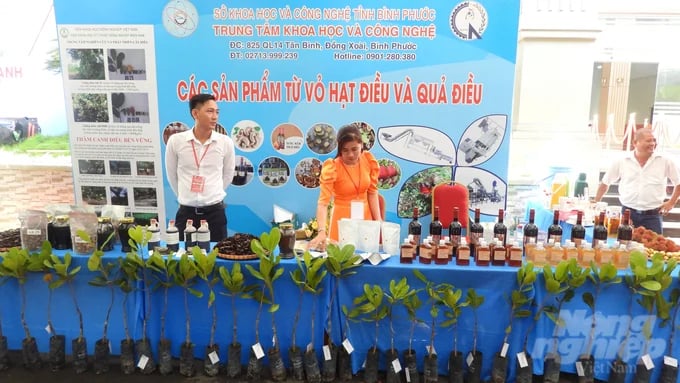May 29, 2025 | 08:49 GMT +7
May 29, 2025 | 08:49 GMT +7
Hotline: 0913.378.918
May 29, 2025 | 08:49 GMT +7
Hotline: 0913.378.918
For many years, Binh Phuoc cashews have been highly regarded by consumers both domestically and internationally for their quality and nutritional value, making the cashew tree the number one industrial crop of the locality.
Currently, Binh Phuoc is considered the "cashew capital" with over 152,000 ha of cashew plantations, accounting for nearly 50% of the country's total cashew cultivation area. Binh Phuoc cashews are primarily grown in the districts of Bu Dang, Bu Gia Map, Phu Rieng, and Dong Phu.

Binh Phuoc is recognized as the "cashew capital," but paradoxically, enterprises in this industry still face a shortage of raw materials for various reasons. Photo: Tran Trung.
In 2018, the Intellectual Property Office granted a geographical indication registration certificate for Binh Phuoc cashew products. The People's Committee of Binh Phuoc province is the organization responsible for managing this geographical indication.
With a large area and high-quality cashew production, Binh Phuoc hosts the highest concentration of cashew processing factories and facilities. According to information from the Binh Phuoc People's Committee, by 2022, the province had approximately 500 enterprises engaged in cashew processing and trading, accounting for 70% of the country's cashew enterprises and 50-80% of the national cashew processing capacity.
Over the years, investment capital in cashew processing in Binh Phuoc has steadily increased, enhancing the level of processing technology and the degree of automation and mechanization at processing facilities. This improvement has led to higher recovery rates and investment efficiency, resulting in increased processing volumes and export turnover, as well as the emergence of more value-added products.
With its production capacity and technological proficiency, the Binh Phuoc cashew processing industry has effectively addressed the output of the province's raw cashew nuts. Some deeply processed cashew products with high added value have reached premium segments of the cashew value chain and have begun to establish brands in both national and international markets.
These factors have created significant advantages for the Binh Phuoc cashew industry, making cashew nuts the province's leading export commodity with high export value. According to Ms Tran Tue Hien, Chairwoman of the Binh Phuoc People's Committee, Binh Phuoc's cashew export turnover currently exceeds $ 1 billion/year. With such export value, the cashew processing industry annually contributes 30-45% of the province's total export turnover.

Cashew processing capacity far exceeds raw cashew production capacity in the province, calling for fundamental solutions. Photo: Thanh Son.
However, Binh Phuoc enterprises have heavily invested in cashew processing technology over the years (mechanization, automation...), leading to a total processing capacity that far exceeds the province's raw cashew production capacity. According to estimates by Binh Phuoc cashew enterprises, current raw cashew production meets only about 30% of processing demand, with the remaining 70% needing to be imported from Africa, Cambodia, Indonesia, and other regions...
While Binh Phuoc's cashew processing enterprises are increasingly reliant on imported raw cashews, the province's cashew cultivation area is shrinking.
The reason is that cashew farmers are struggling with low and unstable yields, resulting in low economic efficiency. Consequently, many cashew farmers in Binh Phuoc are gradually shifting to other crops.

Farmers in Binh Phuoc still face difficulties due to low yields and prices of raw cashew nuts. Photo: Tran Trung.
With a 35-ha cashew orchard, Mr Pham Dai So, from the border commune of Bu Gia Map (Bu Gia Map District), is one of the few farmers maintaining a large cashew area in the locality. Mr So said that in previous years, despite weather impacts, yields still reached over 1 ton/ha. This year, however, is the worst affected, with yields dropping to less than 400 kg/ha. Moreover, the purchase price of fresh cashew nuts is VND 1,000-2,000/kg lower than in the same period last year, leading to a situation where revenue does not cover costs. He is also considering converting part of his land to rubber cultivation to improve his economic situation.
"The price of cashew nuts in recent years has fluctuated around VND 20,000-25,000/kg, while the cost of living keeps rising. If cared for properly, cashew yields range from 1.2 to 2.5 tons/ha, with an average income of about VND 40-50 million/ha. Compared to other crops, this income is relatively modest. With a large area like mine, it is somewhat stable, but for families with less than 3 ha, it’s like planting for fun", Mr Pham Dai So shared.
According to the Binh Phuoc Department of Agriculture and Rural Development, Binh Phuoc is Vietnam's centre for cashew processing, and Vietnam is the world's centre for cashew processing. However, there is no sustainable cashew material area, as cashew-growing areas in Binh Phuoc and across the country are shrinking, with yields declining. This situation forces factories to compete to buy raw cashews from Africa.
"Most cashew processing facilities in the area have not invested in developing raw material zones; they have not supported or signed purchase contracts with cashew farmers, resulting in unstable raw material supplies and domestic shortages for processing. Additionally, the linkage between enterprises and farmers in the production-processing-business chain is not tight. Many cashew processing facilities are very small-scale with limited financial capabilities," remarked Mr Tran Van Phuong, Deputy Director of the Binh Phuoc Department of Agriculture and Rural Development.
Identifying cashews as the main industrial crop and key export product for many years to come, given the high global demand, Binh Phuoc province has set ambitious goals for its cashew industry. Specifically, by 2025, the production value of various types of cashew nuts and cashew nut shell oil is expected to exceed VND 43 trillion, with the proportion of deeply processed cashew nuts reaching 15% or more. By 2030, the production value of cashew nuts and cashew nut shell oil is projected to reach VND 69 trillion, with the proportion of deeply processed cashew nuts reaching 25% or more.
To achieve these goals, Binh Phuoc is planning to establish a raw material area of 140,000 ha, concentrated in the districts of Bu Gia Map, Phu Rieng, Bu Dang, and Dong Phu.

Cashew affirmed as a leading industrial crop, Binh Phuoc is setting ambitious goals for the sector. Photo: Tran Trung.
Alongside this, Binh Phuoc is implementing strategies to enhance the economic efficiency of cashew cultivation, ensuring farmers' confidence in this crop and creating a stable, sustainable source of raw materials for cashew processing plants. The primary solution is to increase cashew yields in the province by closely aligning with cashew cultivation zone planning and researching high-yield, high-quality cashew varieties suited to the province's natural conditions. The focus is on technical measures to achieve cashew yields of 2.5 tons/ha or more.
Furthermore, Binh Phuoc aims to swiftly transition its cashew industry to organic agricultural production, with at least 5-10% of the raw material area adopting organic farming practices.
To enhance cashew processing capacity, Binh Phuoc is calling for investment and providing financial support for technical infrastructure in at least two cashew processing industrial clusters. Large-scale cashew production and processing enterprises are being attracted to these industrial clusters to foster collaboration and establish concentrated, standardized, and market-leading production chains, connecting with neighbouring provinces to ensure sufficient market leadership capacity. Concurrently, the establishment of bonded warehouses and agricultural markets in Binh Phuoc province serves to facilitate trading, import, and export activities for cashew products.
Translated by Hoang Duy

(VAN) FAO’s Director-General addresses the 5th Baghdad International Water Conference.
/2025/05/26/1716-4-nongnghiep-191706.jpg)
(VAN) Chain linkages, technological innovation, and raw material zoning are three strategic pillars for the coconut industry to strongly develop and elevate its position on the global agricultural map.
![Advanced mariculture – an inevitable trend: [4] Accompanied by scientists](https://t.ex-cdn.com/nongnghiepmoitruong.vn/608w/files/sohk/2025/05/13/1941-pgsts-vo-van-nha-140958_717.jpg)
(VAN) According to Assoc. Prof. Dr. Vo Van Nha, Director of the RIA III, the development of advanced offshore mariculture is no longer an option but an essential path for Vietnam’s fisheries sector.

(VAN) Vietnam is intensifying the development of mollusk farming areas that meet international standards, aiming for sustainable growth and enhancing its export position in the global seafood market.
![Advanced mariculture – an inevitable trend: [3] Policy-driven momentum](https://t.ex-cdn.com/nongnghiepmoitruong.vn/608w/files/doanhtq/2025/05/21/0104-0616-0348-nuoi-bien-170339_789.jpg)
(VAN) To ensure the success of offshore mariculture that uses advanced technologies, it is essential to establish supportive policies that inspire both individuals and enterprises to invest with confidence.
![Advanced mariculture – an inevitable trend: [2] Outstanding results](https://t.ex-cdn.com/nongnghiepmoitruong.vn/608w/files/sohk/2025/05/12/4632-4136-nuoi-bien-11-164117_819.jpg)
(VAN) Pilot models of high-tech offshore mariculture in Vietnam, particularly in the South Central Coast region, have demonstrated exceptional economic returns and sustainability, setting a new direction for the country’s aquaculture industry.
![Advanced mariculture – an inevitable trend: [1] Moving offshore](https://t.ex-cdn.com/nongnghiepmoitruong.vn/608w/files/phucpm/2025/05/18/0252-2436-nuoi-bien-6-162148_783.jpg)
(VAN) Mariculture using advanced technology and moving offshore is an inevitable trend, as nearshore areas increasingly reveal limitations.